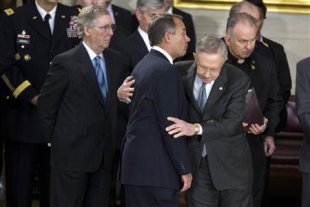WASHINGTON (AP) — President Barack Obama was preparing to present a limited fiscal proposal to congressional leaders at a White House meeting Friday, a make-or-break moment for negotiations to avoid across-the-board tax increases and deep spending cuts at the first of the year.
Lawmakers and White House officials held out a slim hope for a deal before the new year, but it remained unclear whether congressional passage of legislation palatable to both sides was even possible.
The Friday afternoon meeting among congressional leaders and the president — their first since Nov. 16 — was likely to center on which income thresholds would face higher tax rates, extending unemployment insurance, and preventing a cut in Medicare payments to doctors, among other issues.
For Obama, the eleventh-hour scramble represented a test of how he would balance strength derived from his re-election against an avowed commitment to compromise in the face of divided government. Despite early talk of a grand bargain between Obama and House Speaker John Boehner that would reduce deficits by more than $2 trillion, the expectations were now far less ambitious.
Although there were no guarantees of a deal, Republicans and Democrats said privately that any agreement would likely include an extension of middle-class tax cuts with increased rates at upper incomes, an Obama priority that was central to his re-election campaign.
A key question was whether Obama would agree to abandon his insistence during the campaign on raising taxes on households earning more than $250,000 a year and instead accept a $400,000 threshold like the one he offered in negotiations with Boehner. Another was whether Republicans would seek a higher income threshold.
The deal would also likely put off the scheduled spending cuts. Such a year-end bill could also include an extension of expiring unemployment benefits, a reprieve for doctors who face a cut in Medicare payments and possibly a short-term measure to prevent dairy prices from soaring, officials said.
If a deal was not possible, it would become evident at Friday's White House meeting, and Obama and the leaders would leave a resolution for the next Congress to address in January.
Such a delay could unnerve the stock market, which edged lower for a fifth day Friday amid worries that lawmakers would fail to reach a budget deal. Economists say that if the tax increases are allowed to hit most Americans and if the spending cuts aren't scaled back, the recovering but fragile economy could sustain a traumatizing shock.
Obama called for the meeting as top lawmakers on Thursday alternately cast blame on each other while portraying themselves as open to a reasonable last-minute bargain.
Senate Democratic Leader Harry Reid all but conceded that any effort at this late date was a long shot. "I don't know timewise how it can happen now," he said.
The No. 2 Senate GOP leader, Jon Kyl of Arizona, said it is "pretty unlikely" that Senate Republicans would agree to legislation averting the fiscal cliff if it wouldn't pass muster in the House.
"If you know the House isn't going to do something, why go through the charade?" he told reporters. "That becomes political gamesmanship."
Obama and Reid, D-Nev., would have to propose a package that Senate Republican Leader Mitch McConnell would agree not to block with procedural steps that require 60 votes to overcome.
Sen. Chuck Schumer of New York said he still thinks a deal could be struck.
The Democrat told NBC's "Today" show Friday that he believes the "odds are better than people think."
Schumer said he based his optimism on indications that McConnell has gotten "actively engaged" in the talks.
Appearing on the same show, Republican Sen. John Thune noted the meeting scheduled later Friday at the White House, saying "it's encouraging that people are talking."
But Sen. Bob Corker, R-Tenn., predicted that "the worst-case scenario" could emerge from Friday's talks.
"We will kick the can down the road," he said on "CBS This Morning."
"We'll do some small deal and we'll create another fiscal cliff to deal with the fiscal cliff," he said. Corker complained that there has been "a total lack of courage, lack of leadership," in Washington.
If a deal were to pass the Senate, Boehner would have to agree to take it to the floor in the Republican-controlled House.
Boehner discussed the fiscal cliff with Republican members in a conference call Thursday and advised them that the House would convene Sunday evening. Rep. Tom Cole, R-Okla., an ally of the speaker, said Boehner told the lawmakers that "he didn't really intend to put on the floor something that would pass with all the Democratic votes and few of the Republican votes."
But Cole did not rule out Republican support for some increase in tax rates, noting that Boehner had amassed about 200 Republican votes for a plan last week to raise rates on Americans earning $1 million or more. Boehner ultimately did not put the plan to a House floor vote in the face of opposition from Republican conservatives and a unified Democratic caucus.
"The ultimate question is whether the Republican leaders in the House and Senate are going to push us over the cliff by blocking plans to extend tax cuts for the middle class," White House communications director Dan Pfeiffer said. "Ironically, in order to protect tax breaks for millionaires, they will be responsible for the largest tax increase in history."
Boehner, McConnell, Reid and House Democratic Leader Nancy Pelosi are all scheduled to attend Friday's White House meeting with Obama. Vice President Joe Biden will also participate in the meeting, the White House said.
___
Associated Press writers Alan Fram, Charles Babington and David Espo contributed to this report.
___
Follow Jim Kuhnhenn on Twitter: http://twitter.com/jkuhnhenn











